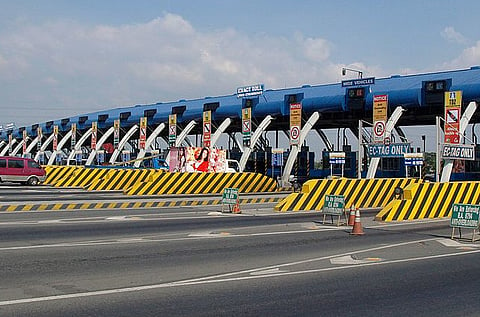
- NEWS
- the EDIT
- COMMENTARY
- BUSINESS
- LIFE
- SHOW
- ACTION
- GLOBAL GOALS
- SNAPS
- DYARYO TIRADA
- MORE

The Toll Regulatory Board (TRB) urged motorists using expressways to avail Radio Frequency Identification (RFID) for their vehicles before the implementation of Joint Memorandum Circular (JMC) No. 2024-001 or the “Revised Guidelines For All Vehicles Travelling On Toll Expressways”.
This new policy aims to enforce cashless toll collection and maintain sufficient load when using TRB-controlled tollways.
The Department of Transportation earlier deferred the implementation of this program to January 2025.
In a Palace briefing, TRB Executive Director Alvin Carullo disclosed that 4.8 percent still hasn’t installed RFID devices, which translates to around 100,000 vehicles.
“About 100,000, so the number of vehicles without RFIDs is still big. So we are asking our tollway express users who do not have RFID yet, to install RFID as soon as possible,” he said.
However, around 95.2 percent of cars using the expressways have RFID devices installed.
Meanwhile, Carullo also asked motorists to update their data with toll operators in order to access their Statement of Account (SOA) efficiently.
Interoperability of RFID devices
Currently, motorists use two kinds of RFID devices: Autosweep for travellers going South Luzon, and Easytrip for travellers going North Luzon. These are also operated by two different companies.
The TRB is aiming to use only one RFID for both tollways.
According to Carullo, the TRB is in Phase 3 of the testing stage of interoperability and plans to implement it by 2025.
“At this time, our interoperability project, we are in phase 3. Hopefully, there will be only one wallet and then we call it RFID. And we plan to implement it early next year as well,” he said.
Real time indicators
Frequent users of expressways face problems whenever they pass through toll booths as load balance do not usually reflect in real time which can cause bigger problems once the JMC is implemented.
Carullo said toll operators are required to show balance and deduct tolls in real time.
“We had a dialogue with toll operators that they need to intensify their “propagation” at the lane level so that it becomes real time. So, within the period, starting from this day until maybe when we implement it by January or onwards, it must be fixed,” he said.
Toll operators who will not be able to comply might face penalties minimum of P100,000
Carullo added that if the systems are not fully functional to their standards by January 2025, further deferment of the implementation of JMC may be possible.
'Exceptional transaction'
Some vehicle owners from far provinces argue that they only use the expressways when going to Manila which is not often, some only use the expressways maybe twice or thrice a year, which can also become a problem come January.
The TRB said these travelers can enter a dedicated lane called “exceptional transaction”, which is similar to how cash lanes worked.
These dedicated lane is placed on the rightmost lane of the expressway. Motorists who seek to continue paying in cash can also use this lane.
Following the wide implementation of the RFID system, motorists lining up in cash lanes have caused traffic at toll booths.
However, they will be required to avail an RFID device for their vehicles.
Carullo added that vehicle owners can only load exact amounts to their vehicle’s RFID wallet to prevent “cash float” or money that sits in their RFID accounts.
Under the JMC, motorists who will be using expressways without valid RFID tags or electronic toll collection (ETC) device shall be penalized as “No Valid ETC Device” and will be fined:
- For First offense - P1,000
- Second offense - P2,000
- Subsequent offenses - P5,000 per offense
For vehicles with insufficient balance will be tagged as “Insufficient Load” and will face fines between P500 to P2,500:
- First offense - P500
- Second offense - P1,000
- Subsequent offenses - P2,500 per offense
Meanwhile, vehicles with fraudulent, tampered, or fake RFID device and e-card upon entry and shall be listed as "Fraudulent or Falsified ETC"
The following fines will be imposed:
- First offense - P1,000
- Second offense - P2,000
- Subsequent offenses - P5,000 per offense
For his part, Transportation Secretary Jaime Bautista assured the public that they will do everything they can to ensure toll operators have complied before implementing the new toll policies.
The DOTr will also continue its campaign for motorists to avail RFID or ETC devices in their journey in expressways.
